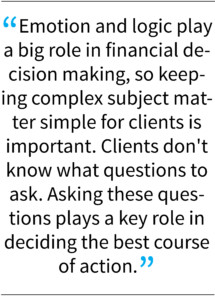Your Retirement … with Brian & Bob: Leveraging financial planning for human needs
Planning should reflect client needs for them to feel significant connection
By Brian Harrigan and Bob Price
 The Chinese language has two symbols for crisis. One symbol signifies danger. The other, opportunity. Let’s focus on opportunity during this coronavirus crisis.
The Chinese language has two symbols for crisis. One symbol signifies danger. The other, opportunity. Let’s focus on opportunity during this coronavirus crisis.
In life, there will be positive and negative memories when reflecting on past decisions. Some choices are counter-intuitive. These decisions can sabotage future opportunities for financial success while others can be life changing.
Planning for life’s challenges is something we all must all tackle to some degree in order to satisfy our basic needs. Self-help experts have broken these needs down into several categories. These categories are listed below with simple explanations:
-
Certainty: Assurance you can avoid pain and gain pleasure.
-
Uncertainty/Variety: The need for the unknown, change, new stimuli.
-
Significance: Feeling unique, important, special or needed.
-
Connection/Love: A strong feeling of closeness or union with someone or something.
-
Growth: An expansion of capacity, capability or understanding.
-
Contribution: A sense of service and focus on helping, giving to and supporting others.
With the knowledge of these six basic needs, how do we financially position ourselves to fulfill them in a manner that fosters feelings of accomplishment? This is a difficult question. Especially during the COVID 19 global pandemic.
Planning for your financial future now can address these six needs. Each of us may rank these differently. Emotion and logic play a big role in financial decision making, so keeping complex subject matter simple for clients is important. Clients don’t know what questions to ask. Asking these questions plays a key role in deciding the best course of action.
Knowing the different financial tools available is one piece of the puzzle. How you use these tools is equally important when addressing needs. Keep that in mind when choosing a trusted advisor.
 As financial professionals, we address certainty and uncertainty (needs 1 and 2) initially by gathering information. Without the proper information, wrong choices can be made and this can hurt your chances of maintaining your ideal lifestyle and legacy plans. Client risk tolerance and objectives also play key roles.
As financial professionals, we address certainty and uncertainty (needs 1 and 2) initially by gathering information. Without the proper information, wrong choices can be made and this can hurt your chances of maintaining your ideal lifestyle and legacy plans. Client risk tolerance and objectives also play key roles.
Once addressed, we evaluate asset allocation and risk tolerance. These play key roles for clients during the three phases of estate/retirement planning.
-
Accumulation Phase — growing assets as much as possible early on.
-
Conservation Phase — protecting assets you have grown.
-
Distribution Phase — efficiently distributing and protecting your assets.
Clients generally take on less risk as they age because they no longer have the time to make up for losses. Risk tolerance affects the tools used in diversification which can each have different tax benefits.
Connecting with clients in a significant way (needs 3 and 4) when explaining the value of diversification all boils down to knowledge, creativity and trust.
People don’t care how much you know, until they know how much you care. Planning should reflect client needs for them to feel significant connection. Connection helps one feel significant but also has a positive effect on others close to them. Some say connection fuels growth and contribution.
Growth and contribution (needs 5 and 6) have to be present in order for us to evolve as individuals and eventually retire someday.
How you contribute, at what amount, and how future tax implications can affect this growth are all things one should be familiar with. Certainty and uncertainty are healthy when trying to grow. Life is about taking calculated risks by leveraging your resources.
If planning now can help address these needs, why wait? There is never a “perfect time” to get started.
Money can’t buy happiness, but having it can certainly reduce stress and improve quality of life. The opportunity this crisis presents is the ability to start planning. Seize your opportunity to accomplish retirement and legacy goals, but also personal development. The time to take action is now.
- Your Retirement … with Brian & Bob: Adjust your retirement portfolio to account for threat of inflation - January 28, 2022
- Your Retirement . . . with Brian & Bob: ‘Build Back Better Act’ passes economic package with tax changes - December 2, 2021
- Your Retirement . . . with Brian & Bob: Learn to maximize your pension by understanding all the options available - July 29, 2021
